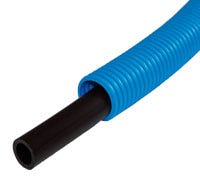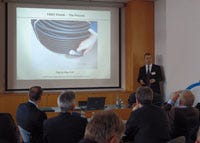World Tour: Meeting customers’ needs spurs Turkish processor to offer PIP
In tough times, processors should be on the outlook for new opportunities to spark their business engine. Turkey’s largest pipe and profile processors saw that chance with pipe-in-pipe (PIP) technology.Firat Plastik Kaucuk (Büyükcekmece/Istanbul, Turkey), says it saw shifting market trends in demand from its crosslinked polyethylene (PE-Xb, ‘b’ = silan crosslinking) for radiator heating systems.
June 5, 2009
In tough times, processors should be on the outlook for new opportunities to spark their business engine. Turkey’s largest pipe and profile processors saw that chance with pipe-in-pipe (PIP) technology.
Firat Plastik Kaucuk (Büyükcekmece/Istanbul, Turkey), says it saw shifting market trends in demand from its crosslinked polyethylene (PE-Xb, ‘b’ = silan crosslinking) for radiator heating systems.
|
In the pipe-in-a-pipe technology, the smooth crosslink pipe gains the protection of a corrugated outer shell that lets installers easily handle, bend, and connect the system at the building site. “A real driver for us to enter this market came from installers themselves who didn’t want to have to thread one pipe into another over many meters but have a double pipe or pipe-in-pipe system delivered and immediately ready to connect,” says Cagatay Tulunay, Firat’s R&D manager, speaking at a public pipe-in-pipe extrusion symposium organized and conducted by processing equipment supplier Unicor (Hassfurt, Germany) in early spring.
At Unicor, Hubert Koßner, R&D manager, says threading pipes manually has the additional disadvantage of damaging an EVOH barrier layer if included and one step, double pipe extrusion can be achieved in the same speed as extruding two separate pipes. His company’s UV58/90V corrugator for PIP production and cable insertion was first delivered to a customer in 1998. Tulunay says the first line it installed, a Unicor UC75/81iV, started up in 2005 with two additional lines going into service a year later.
“Why did we do it? In 2004 we saw benefits and advantages, a means to increase sales of our PE-Xb pipe products, and changing demands coming from our customers who didn’t want to deal with two coils of pipes at the building site,” Tulunay says. The PIP in various sizes is extruded, coiled, loaded on pallets before being moved into steam-pressure chambers to cure at 90-115°C until the desired crosslinking has been achieved. A 2-mm PIP can take about two hours to cure, so it has three steam chambers that accommodate 96 coils each, he says. Barrier pipes containing an EVOH layer need to be cured at less than 115°C so as not to damage the polymer, he says. The processor extrudes a polypropylene block copolymer for the corrugated outer pipe. Following crosslinking, the company checks crosslinking value of coils taken from both ends of the pallet as well as from the center.
Unicor’s Koßner warns that one disadvantage processors may have to live with is that the smaller the corrugated casing, the more chance one needs to reduce the speed of the line to ensure correct extrusion. “With this type of pipe we are also dealing with no unified international standards. What is out there are either company-internal norms, specific region-defined standards such as Nortest WS129 or KIWA536, or EN61386 but that is for electrical conduit,” he says.
For Firat Plastik, which is Turkey’s only PIP processor so far, the top decision to offer PIP was to stimulate PE-Xb pipe growth. This was coupled with concerns of cost. It saw lower transport costs (delivering a single coil compared to having to ship two separate coils) and fewer operators were needed during processing. “We insisted that there also be no compromise in PIP processing compared to single pipes and we have achieved just that with an extrusion speed of 32 m/min.,” Tulunay says.
The company’s figures also show a shift in demand since introduction of PIP in 2005. Back then the sales percentage of PE-Xb pipe (DN16x2) without protective corrugated outer pipe was more than 90% compared to PE-Xb with PIP at less than 10%. Last year the figures had reversed to PE-Xb with PIP taking more than 80% of the processor’s PE-Xb pipe sales. That represented more than 20 million meters of PIP last year. Firat Plastik, founded in 1972, has nine plants at two sites in Istanbul and Ankara. —[email protected]
About the Author(s)
You May Also Like




